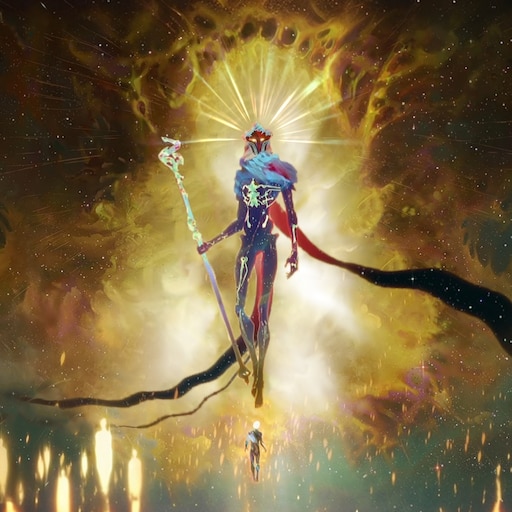Thinking about
the glorious(???) evolution
Arcane Season 2 was, ultimately, thematically underwhelming. Which is sad because of the early promise of the season. Good setups, bad payoff. The main storyline I cared about was Jayce and Victor and the hex... thing. The Arcane, I guess? I'm not really sure what the Glorious Evolution was intended to represent; I think the show relies on external tropes to inform us that
Hiveminds = bad
Is it a weird take to not buy that automatically? That seems like a hypothesis that the show should prove, right? Or at least one that a show more interested in its own themes might want to interrogate. They showed us a pretty happy and functional hive-community and no negative consequences until external forces intrude with great violence so I didn't walk away convinced by the characters' reactions to any of this. Possibly my own "but what if hivemind good?" is merely a trolling antithesis to this show's very confused thesis.
ant-ithesis
On the other hand I'm re-experiencing the end of the Chimera Ant arc of Hunter x Hunter and what a fantastic show. The near-standstill imposed on narrative time in the castle invasion is masterful; the show suddenly becomes novelistic, invested in exposing every character's interiority. This is also frustrating and suspenseful, which is appropriate. We spend entire episodes without knowing what's happening to the main characters except that they're embroiled in conflict somewhere in this mansion. Killua's arc is just as affecting on rewatch.
Most striking this time though is Pouf's fear of change; he loves the King not as he is now but as he was when Pouf first knew him. When he gets the opportunity to erase the memories that make the King someone less familiar to him, he does. This is obviously incredibly selfish! But he doesn't see it that way; in his mind Komugi is a Siren pulling the King away from his true course, and he is the rope tying the King to the mast, fighting for his own good even against his momentary impulses. And from inside Ant society, Komugi very definitely is bad news. The more human their culture becomes, the more we the human audience are invited to like it but the less it is theirs.
ant-archy
Noteworthy that the Chimera Ant arc gives us a clearer idea of the political world inhabited by the Hunters; the early part of the arc lightly explores the husk of a corrupted idealist state. (I'm not historically literate enough to know whether the NGL has a specific real-life referent; the Rose bomb/nuclear nonproliferation story beat makes me believe it's somewhat likely.)
Are the ants thwarted colonizers who are corrupted from within by cultural impurity? Whether or not that's good news to an individual viewer might depend on their level of tolerance for pluralism. Except for the flesh-eating; probably we all agree on that.
ant-erpretation
The Ants accelerating evolution is a pretty good metaphor for accelerating social change. Humanity and Nen are both acceleration factors akin to the industrial revolution or the internet or whatever.
How does this reflect my own fear of change back to me? AI/market forces/whatever is actively overwriting the culture I grew up with. If I could put ChatGPT back in the box, at the time of this writing, I definitely would. Am I an ant-monster?
obviousness
Speaking of which HE'S A BUTTERFLY I CAN'T BELIEVE I DIDN'T CATCH THIS. The emblem of self-evolution refuses his own most obvious theme. As well as the thematic foundation of the Ants' whole deal: they are what they eat. Everything they consume changes them. (How like life?) Shaiapouf stands at his own place in evolutionary history and looks back with contempt and forward with fear.
in which i remind you that i also read serious media but i don't think about it that hard because the themes are honestly best expressed by the story itself
I thought about a story from Ted Chiang in Exhalations, in which he explores the consequences of technology on cognition. Delightfully, the story takes on the question of "technology" as broadly as possible: not merely scifi-appropriate memory implants but also writing itself. How are we to deal with changes to human experience?
ant-a karenina
The section of Anna Karenina I'm currently reading is about evolution writ much smaller... Anna has revealed her infidelity to her husband. She imagines that this will break the chrysalis of a new life for her, but Alexey swiftly puts the cat back in the bag, and Anna cannot seem to resolve to actually shatter her own life. Change is terrifying! Levin, too, is also (though a little more comically, to my mind, because of the repetition of his reversals) yearning for something else and continually resolving to exchange his life for one aligned with his values. Also scary! He's a little silly but very sympathetic, in this regard, especially when his brother shows up both to remind him of the bourgeouis values he's explicitly rejecting and also to chastise him directly for the concessions he's already made to break away from those values. Self-determination invites resistance.
counterpoint: the fear of boredom
I am also reading Madame Bovary, and have watched the first 3 episodes of Severance. Both of these things are partially about how soul-crushingly boring it is to be alive when one is lonely and stuck.

